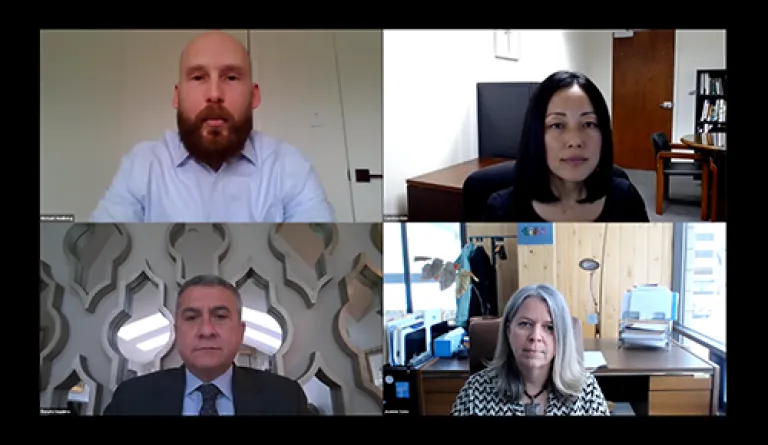Pandemic Positives Speaker Series Features Resourcefulness in a Crisis, Part 2

In March, IAALS wrapped up our Pandemic Positives Speaker Series, bringing together a number of courts and legal service providers who, in the wake of the COVID-19 pandemic, transformed their day-to-day operations to continue serving the public. These organizations quickly implemented new processes for providing both in-person and virtual services, ensuring access to information and assistance to those who cannot afford an attorney. With the pandemic still ongoing, and in an effort to share lessons learned across jurisdictions, IAALS hosted this speaker series to bring together innovators and attendees to learn about best practices. Videos and summaries of the last two events are available below. (Read about and view the first two events here.)
Finding Economical Solutions
On March 11, IAALS hosted a webinar featuring Carolyn Kim and Renato Izquieta of the Orange County Superior Court and Jeannie Sato of the Alaska Court System, who discussed how their respective organizations were able to successfully transform their in-person legal services into virtual services amid the pandemic—without expending significant resources.
Due to the Alaska’s large size and limited road system, the state’s court system was in many ways already set up for remote services, said Sato. “Because so many court locations are [in remote locations], in-person services would not be equally accessible to all Alaskans. So, from the beginning of our family law self-help center in 2001, we operated through a toll-free phone helpline and did not meet with customers in person [for many of our services].” Customers had access to self-help webpages with FAQs, forms, and information about a variety of case types; the self-help center also offered two in-person classes in Anchorage.
When the pandemic hit in March 2020, there was confusion among parents and family law attorneys alike about how to follow a parenting plan alongside the rapidly changing health and safety guidelines and government mandates. All court hearings had been temporarily suspended, so parents weren’t able to get answers. To address this, their team “was able to work with the presiding judges . . . to issue a statewide order that gave general guidance to address a lot of questions parents had.” They communicated all the changes people needed to know immediately on the self-help center’s website in plain-language FAQs.
As far as the two classes in Anchorage, one of them was immediately moved to a Zoom meeting format; the other class, which was court-ordered, was at first held over the phone and then moved to Zoom. Although this format posed several challenges, the self-help center did some troubleshooting and made easy changes such as requiring registration, disabling the chat and enabling questions, and moving the class to a time when it would be easy for participants to call the center afterward with additional questions.
Renato Izquieta then described how, at the beginning of the pandemic, the Orange County Superior Court designated certain services (such as those addressing sexual harassment, domestic violence, eviction lockout, and elder abuse) as essential: “The court very quickly turned to self-help because they knew that self-help has all those ingredients and a staff that can address these issues.” Once it became clear the entire courthouse would need to close to the public, the team turned to the IT department to create telephone numbers and email addresses to provide assistance remotely.
Izquieta and his team also used existing tools to provide services to the public during the pandemic both virtually and in person. The team directed people to the court website for information and also set up signage and tables outside the courthouse with instructions on who to contact. In addition, they offered remote document review services and filing support as well as expanded their phone and email services; people were able to both email and drop off physical documents in a designated drop-box.
Carolyn Kim then offered some highlights as to how the Orange County Superior Court is now operating in the new pandemic normal. Each case type team has their own separate phone line and email for the public; this compartmentalization has resulted in the teams becoming resident experts in their case types. “The self-represented litigant community also benefits because they receive better quality and depth of services on more case types.” For those needing restraining orders or other emergency services, onsite staff prioritize the calls coming from the self-help emergency center line and triage as necessary.
“I would say that providing our services via email has really been key to providing access to the public outside of regular court hours,” Kim said. The center does mail paper forms to litigants who prefer them to digital, and to incarcerated litigants.
Looking back on the past year, Kim noted the need for ongoing evaluation to see what works and to redefine processes. Even checking in on a weekly basis to make small tweaks to their workflow response made a big difference to their litigants.
Pandemic Positives: How to Go Virtual Without Breaking the Budget from IAALS on Vimeo.
Balancing Necessities
On March 25, IAALS hosted a webinar featuring Presiding Judge Clemens Landau of the Salt Lake City Justice Court and Sheriece Perry of the Massachusetts Trial Courts Office of Court Management, who discussed how their respective organizations were able to balance the necessity of remote services with their customers' in-person needs.
“When the pandemic hit,” Perry explained, “It was almost a complete shutdown in terms of what we were used to—just walking in and helping people, sitting down with them, triaging their cases, providing language access.” Prior to March 2020, the self-help center was a solely in-person, non-technology-based operation, and making the transition to remote services was difficult. The team’s immediate solution was to acquire secure phone numbers for staff and to make flyers with pertinent information to hang up at various courthouses.
However, when it became clear that the pandemic would cause longer-term disruptions, Perry and her team had to reassess. Although technology was the most obvious choice, Perry stressed that it’s not a panacea: technology often places marginalized communities at a disadvantage when it comes to access to justice, as they often don’t have reliable access to bandwidth, internet, or devices, and they aren’t always comfortable using technology.
With this in mind, when the Massachusetts Supreme Judicial Court issued an executive order allowing litigants to file through email, Perry seized on an opportunity—the staff at the self-help center was granted permission to file through email on behalf of litigants, with their consent, and ensure the necessary forms were filled out properly and submitted to the court. “We are going to carry the burden that technology places on our vulnerable populations.”
As she looks toward the future, Perry thinks a hybrid model would allow the center to continue its remote presence. “There’s been a lot to learn through this process, and we really discovered who our vulnerable populations are.”
Judge Clemens Landau then gave an overview of how the Salt Lake City Justice Court has responded to the past year’s extraordinary events. In mid-March, the court cancelled most proceedings and worked quickly to set up social media pages; the staff ended up running court out of an RV parked outside of the courthouse, as well as putting up extensive signage to help patrons understand what was going on and where to get the answers they needed.
Then in July, when most in-person court hearings still weren’t possible, the Salt Lake City Justice Court started using Doodle Calendars to allow patrons to schedule their own hearings, with much success; to date, they’ve conducted about 7,000 hearings using this sign-up method. “We’ve made it work—it’s not easy to do this kind of thing, and Doodle was not designed to be a court-services program, but it was something that allowed us to move in the direction of our court users in terms of trying to do things that are convenient for them.”
This past February, the court started holding regular outreach events, bringing court services to encampments and shelters to help people resolve their cases and get other aspects of their lives back on track. The court has also equipped patrons with technology where possible; they have tablets and phones at the courthouse for people to use, as well as two booths, intended for any individual who doesn’t have the necessary technology to contact their attorney or access their hearing.
Pandemic Positives: Balancing Remote Services with In-Person Needs from IAALS on Vimeo.
We are so grateful to the speakers for the insights and inspiration, as well as to everyone who attended.
